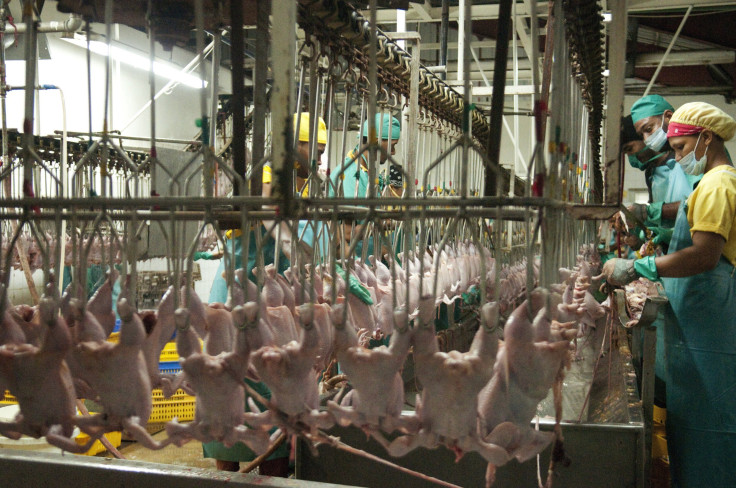Poultry Workers Denied Bathroom Breaks Wear Diapers Or Risk Impacted Bowel: Report

“No Relief,” a new Oxfam America report, highlights an issue plaguing the roughly 250,000 poultry workers in the United States. Oxfam, a self-described global organization "working to right the wrongs of poverty, hunger, and injustice," claims Pilgrim's Pride, Tyson Foods, Perdue, and Sanderson Farms are denying their workers bathroom breaks. Both current and former workers interviewed for the report say their supervisors ignore their requests, threatening punishment or firing.
“Workers struggle to cope with this denial of a basic human need,” wrote the authors of the report. “They urinate and defecate while standing on the line; they wear diapers to work; they restrict intake of liquids and fluids to dangerous degrees; they endure pain and discomfort while they worry about their health and job security.”
According to the report, one survey records nearly 80 percent of 266 workers in Alabama saying they are not allowed to take bathroom breaks when needed, while a recent survey in Minnesota revealed that the majority of 15 production workers interviewed said they got fewer than two bathroom breaks in a week. Poultry workers at a plant in North Carolina recently launched a campaign solely around the issue, demanding their company provide them with bathroom breaks when needed.
While workers’ dignity suffers, the greatest danger of this situation are the risks of serious health consequences.
Holding It In
Holding in urine is something most of us do, after all, there are many situations when a bathroom is not available. While a short delay does not hurt you, long delays are simply unhygienic. According to this Columbia University website, a bladder infection is not likely to result from holding urine too long, while research also shows a rupture of the bladder to be equally improbable.
“Consciously holding in your urine will eventually cause the body to override the brain’s attempts to delay urination, and in all likelihood, the person will simply wet their pants,” notes the website.
However, holding in poop can be dangerous, even if you do so rarely, because it allows stools to build up, dry out, and block your system, leading to an impacted bowel. Essentially, a fecal impaction, which is most often seen in people who are constipated for a long time, consists of a large lump of dry, hard stool that cannot pass and remains stuck in the rectum.
Sometimes, the muscles of the intestines forget how to move stool or feces on their own. This can happen with people who regularly take laxatives, or those on certain medications, or those who make it a habit of holding in their poop for long periods of time. A dysfunction in the intestinal muscles used for eliminating waste can develop and impact the bowel. Meanwhile, all the waste and toxins sit in your body. Though surgery is rarely needed, the situation needs to be remedied either by an enema or manual assistance from a healthcare provider.
For these and other reasons, the Oxfam report is disturbing. According to Oxfam, the Occupational Safety And Health Administration interprets U.S. law as requiring employers to “allow employees prompt access to sanitary facilities. Restrictions on access must be reasonable and may not cause extended delays.”
Tyson and Perdue both responded to the authors of the report and delivered comments stating, essentially, that they cannot gauge the validity of these allegations since many workers spoke to Oxfam under condition of anonymity. About a third of the poultry workforce is unionized, says Oxfam, so most workers lack crucial protections.



























